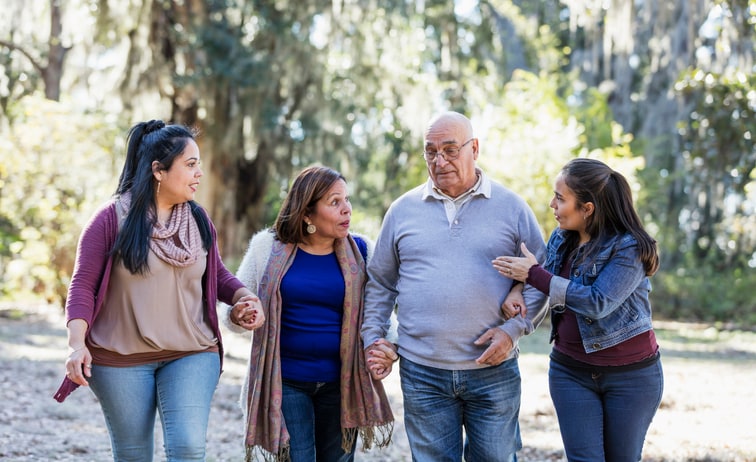When you’re overwhelmed and overburdened, it’s easy to feel that your siblings are standing on the sideline taking potshots. Those on the front lines of caregiving may not say it, but they need support, encouragement, and all hands-on deck. Feeling criticized doesn’t help. This can lead to the “I shouldn’t have to ask” phenomenon. Yes, you should. And you should speak up when you feel ignored, dismissed, and abandoned. Don’t let it simmer until you burst.
Communication can be further complicated when there are three or more of you. Someone always seems to get left out. Growing up, my brother, sister, and I used to play a game that seems pretty mean in retrospect. When the three of us were together, one would start the game by saying, “Funny, but there are only two people in this room. The other one must be a rock.” The designated “rock” would then be totally ignored while the other two siblings played happily together. With adult children, the rock can transform into a giant iceberg, sinking the plans of the more collaborative siblings. While not all siblings can participate equally, it is important to establish a plan of communication that everyone agrees on. Technology can help. Some families use email, Skype, or regularly scheduled conference calls. A website called Lotsa Helping Hands (www.lotsahelpinghands.com) provides an online secure community for caregivers to coordinate and organize information such as appointments, medications, finances, and day-to-day tasks. Online tools are especially useful when siblings are scattered across the country or the globe.
Don’t Be an Air Traffic Controller
Effective communication strategies can shift the burden of responsibility from the alpha daughter (or son) to other family members, including the senior. In some families, one child serves as the parental interpreter and translates Mom’s or Dad’s wishes and frustrations to the other siblings. When you see yourself as air traffic con- trol, taking on the role of communicator-in-chief, you may ultimately make things worse. Rather than ensuring a smooth landing, you are likely to increase the odds of a collision. If your mother complains your sister is never around, let Mom tell your sister that herself. If your father resents your brother’s intrusiveness, don’t play referee. Caregiving may fan the flames of long-standing conflicts between parents and their adult children. Focus on what can be done to help your parents in the present rather than attempt to heal old wounds from the past. If you sidestep getting triangulated in family disputes, you may avoid some of the grief, guilt, and guesswork of trying to solve a problem you can’t fix.
The Fight to Be Right
One of the biggest areas of conflict between siblings is the different perception of parents’ needs and how best to approach care. Exchanges like these happen in many families:
“Our father’s getting really forgetful. I’m worried that he can’t be left alone anymore.”
“Dad’s fine. For eighty-five, I think he’s doing okay.”
“It’s not safe for Mom to live at home anymore. We need to think about nursing homes.”
“Over my dead body! We promised our mother we would take care of her at home.”
Guilt may also be a driver in decision making, especially for the sibling who isn’t around as much and feels the need to step in. The right kind of professional guidance may help minimize conflict and provide you and your family with some realistic solutions. Aging life care professionals can conduct on-site assessments of a senior’s ability to manage safely at home and can recommend resources and home modifications. When hiring an aging life care professional, discuss how information will be shared between you and your siblings. Will you be given a written report or a verbal summary? Will you and your siblings review recommendations before you discuss them with your parent? These professionals must form a trusting bond with elders to develop a mutually agreeable plan of care. They can also help you and your siblings stop struggling over who is right and instead focus on what works best.
Let It Go
As any ten-year-old fan of Frozen can tell you, sometimes you just gotta “let it go.” When it comes to sibling resentments, we hold on to things that happened a lifetime ago. Meanwhile, our parents may not make it any easier. Your mother stokes resentment when she moans about your brother to you but not to him. Your dad relies on your all-suffering sister, who complains bitterly but can never say no. And Mom won’t ask your brother who lives nearby to take her to the doctor because she says he’s too busy. As if you’re not. Years ago at a seminar I was giving about siblings and caregiving a young woman spoke to me about her brother. She had tried everything imaginable to get him to participate in her mother’s care. As a lawyer, she had even threatened him with legal action. Despite numerous efforts, nothing she said or did had any impact. Her brother was either completely unwilling or unable to be a caregiver. It was a painful reality this woman had to acknowledge before she could move forward with a plan. “Let it go,” I said. “Your brother is not going to help. You need to find other sources of support and accept his limitations.” She let go of her quest for fairness and instead focused on what was attainable. Understanding the root cause of the imbalance may help. In this woman’s case, her brother had been the “black sheep,” disappointing their parents for dropping out of college and getting in scuffles with the law. While that doesn’t excuse him from responsibility, it put things in perspective. “He received more anger from my folks, whereas I got more praise,” the woman noted. “He may have had less available to give.”
Life-Long Bond
Recently my family and a host of friends celebrated my sister’s sixtieth birthday. My brother put together a slide show that captured hilarious and poignant slices of my sister’s life throughout the decades. Birthday parties, vacations, graduations, and family gatherings—sixty years of life melded into a beautiful montage. Many people in the photos, like my father, are not with us anymore. Others, such as aunts, cousins, and friends, continue to make up the closely woven tapestry of our family life. As birthdays continue to come and go, many others who were present will be gone. That unspoken reality has brought my brother, sister, and me closer together, knowing that it is up to us to be the torchbearers. We will pass on our parents’ legacies and life lessons to our children. We share a collective memory that is unique to us, a memory that becomes more precious even as it grows dimmer.
In his thought-provoking book Sibling Relationships across the Life Span, psychologist Victor Cicirelli, PhD, reveals a powerful truth: the most enduring relationships in our life are with our brothers and sisters. It is not unusual, according to Cicirelli, to know our siblings twice as long as our parents.11 This knowledge may cement sibling bonds and help us get past the fissures that may accumulate as we grow into adulthood. Our shared memories, both the good and the bad, have the power to transcend our differences. I am immensely grateful that my brother, sister, and I were able to support each other during the course of my father’s dementia. There were many tough times—late-night vigils in the emergency room and the slow, steady progression of a debilitating disease that gradually took my father’s life. But there were also shared joys, laughter, sing-alongs with Dad in the nursing home, and the remarkable gift of being truly present with one another. My siblings and I traveled this life-changing road together, and we’ve continued to uphold and cherish our father’s memory since he’s been gone. That is the gift of having siblings in your life. There may be quarrels and conflicts, but there are also healthy and healing ways to work out your differences and help your parents age with dignity, compassion, and love.
To read the full chapter you can purchase the book here: https://yalebooks.yale.edu/book/9780300221350/my-parents-keeper





